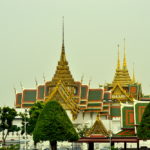
(TAN): The global tourism sector has been badly hit by the coronavirus that recently broke out in China, reports said.
Businesses including hotels, restaurants, airlines and casinos were impacted especially during the Lunar New Year, one of the busiest travel seasons, after Chinese were asked to refrain from travelling and many others avoiding travel across the globe, as per reports.
Thailand, one of the favourite destinations for the Chinese New Year travel, reportedly lost an estimated revenue worth THB 50 million (USD 1.63 billion approximately). While several drugstores in the Thai capital Bangkok ran out of surgical masks, the government said it was distributing masks and that it planned to disinfect the airport rail link, reports said.
[ALSO READ: Lunar New Year: Journey from Chinatown to Downtown]
According to reports, tourism from China was already down even before the virus emerged partly owing to months of protests in Hong Kong, leaving it even more vulnerable to the slowdown in tourism. Experts reportedly said tourism in neighbouring countries such as Singapore, Philippines and Vietnam could also be affected.
Macau’s gaming and lodging operators said cancellations were higher than expected over the Lunar New Year weekend, a report said. Around 80% less visitors from mainland China reportedly travelled to Macau last weekend, compared to a year earlier. Shares of American hotel and casino company Wynn Resorts and MGM Resorts International, American hospitality and entertainment firm, which have operations in Macau, reportedly went down.
As per reports, tourism from China to the United States was already hurt by trade disagreement between Washington and Beijing – travel to the United States declined for the first time in 15 years in 2018.
[ALSO READ: Lufthansa Group now uses 100 percent green electricity in its home markets]
The World Travel & Tourism Council (WTTC) said the sector could take a lasting blow from the virus attack unless it took a leaf out of the previous viral epidemics.
The 2003 SARS outbreak had affected China, Hong Kong, Singapore and Canada economically, and damaged the global travel sector by USD 30 to USD 50 billion. China had lost 2.8 million jobs and 25% drop in tourism GDP.
“While the risk of exposure for travellers and tourists is still low, we are naturally concerned about those who have been affected already. Experience has taught us that global coordination and cooperation, with collaboration between the public and private sector, is going to be vital in containing the spread of the coronavirus throughout China and beyond. We analyse many global crises within WTTC and previous cases have shown us that the economic losses from health epidemics are avoidable, through the effective use of crisis preparedness and management procedures, as well as through managing public panic and making rational decisions through travel,” President and Chief Executive Officer of the WTTC, Gloria Guevara, said.
[ALSO READ: US to impose visa restrictions on pregnant foreign women to curb ‘birth tourism’]
“Previous cases have also shown us that closing airports, cancelling flights and closing borders often has a greater economic impact than the outbreak itself. “The most effective management of a crisis requires rapid activation of effective emergency plans, and we can see that in the early days of this outbreak, the Chinese government has acted rapidly. However, quick, accurate and transparent communication is also crucial in order to contain panic and mitigate negative economic losses. Containing the spread of unnecessary panic is as important as stopping the virus itself,” she added.
China reportedly extended the holiday to February 2 to help prevent the virus from spreading further which so far has killed 80 people and sickened 2,744.




